Husband and wife Nicola Crowley and Dvir Nusery are difficult to interview. Not because they don’t have anything interesting to say – au contraire – it’s just that they can’t finish a story or anecdote without stopping to greet a friend or customer passing by their Middle Eastern-inspired deli, cafe and food shop, Mezze.
“Hello, how are you?” Dvir calls out to each passerby as Nicola and I talk. Alternately, when Dvir is speaking with me, Nicola chats to someone else walking along Tramore’s main drag. The shop is well-placed: perched atop the Co Waterford town’s steepest hill, offering gorgeous views of the Irish sea and the Copper Coast.

Nicola and Dvir originally thought they might open a shop in Dungarvan but after seeing the success of Seagull Bakery decided to stay in Tramore. \ Donal O'Leary
“We take turns sea swimming every other morning,” Nicola tells me as Dvir chats with yet another Tramore resident. He returns to us with coffee and chocolate-covered medjool dates. “I call this one the Snickers,” he points to one of the dates sprinkled with chopped peanuts, “and this one the Bounty,” he points to another one covered in coconut.
A big move
Dvir and Nicola moved to Tramore from Tel Aviv, Israel, in 2015 and have since become active members of the community. You can sense how important the town is to them – and how happy they are to be living where they live and doing what they do; cooking unique, flavourful food and feeding the hungry masses.
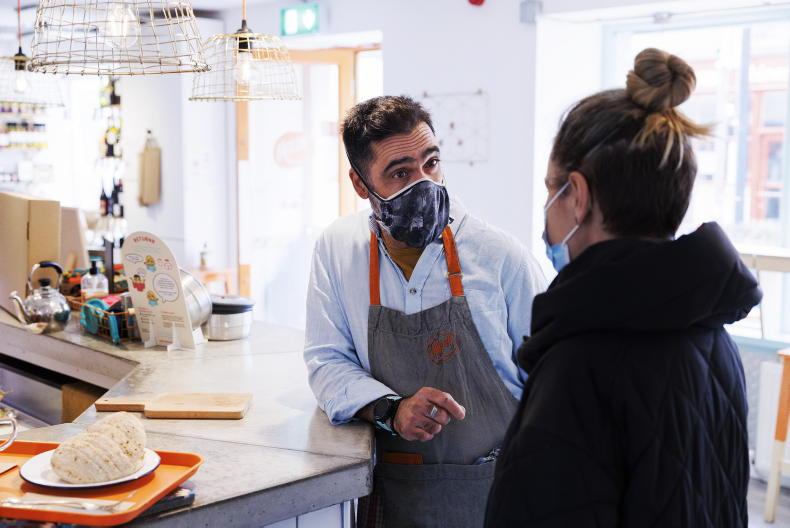
Dvir takes the time to chat to each customer as they walk by the shop or come in for coffee. \ Donal O'Leary
Nicola (a Waterford city native) and Dvir met years ago on the side of a glacier in New Zealand. Both were working, travelling and neither had plans to settle down, but when they met there was an instant connection. Nicola says that, at the time, she had plans to travel to South America which she knew would make or break the relationship.
“We knew we would be separated, so we said we’d see. We weren’t committing ourselves to each other. But then we knew,” she smiles.
Taking the plunge
We talk about the similarities of how we met our significant others (I met my husband while living in South Korea) and how travelling can add urgency to bicultural relationships; in the end, you either break up or someone moves to a new country. In their case Nicola made the move to Tel Aviv at first.
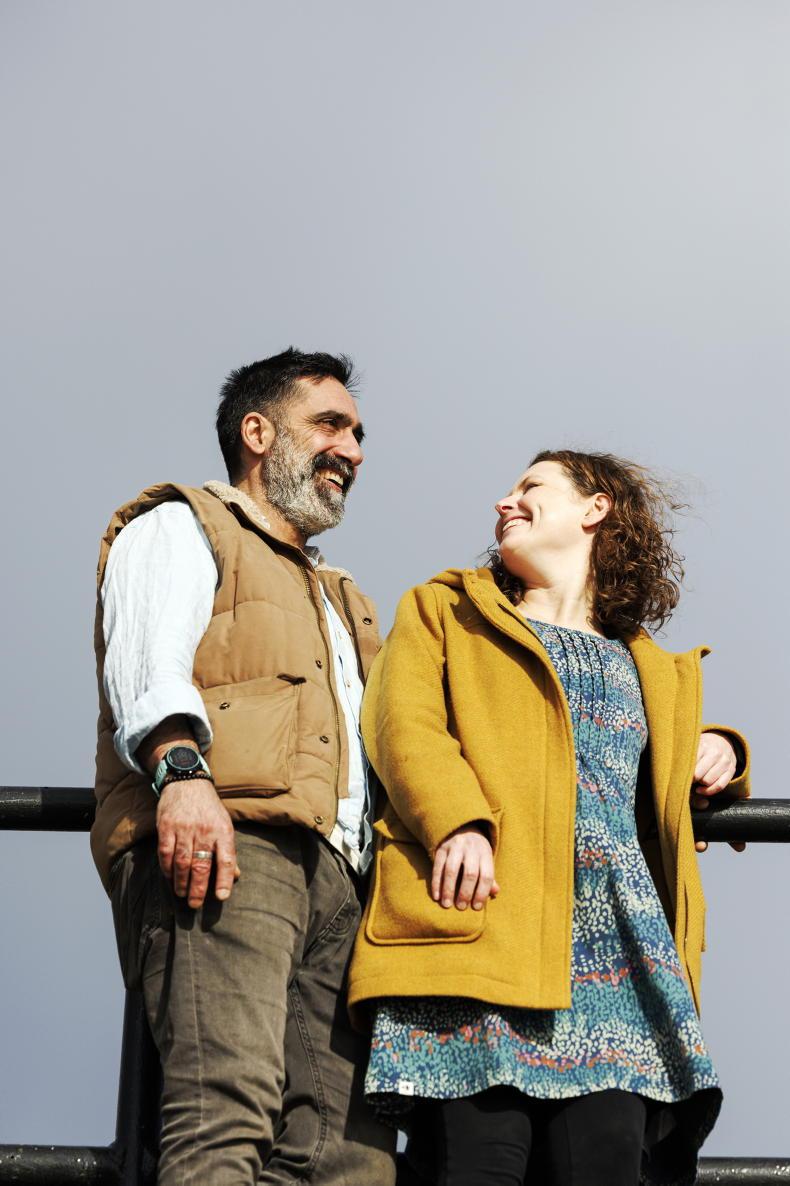
Dvir and Nicola chose to move away from Tel Aviv and big city life to a slower pace. \ Donal O'Leary
“I visited Israel for seven weeks and [at that time] everything was hard,” she says. “I didn’t know anyone. I don’t speak the language. Dvir’s family are so sociable and bubbly and I’m not the type of person to sit quietly in a corner but [at first] I couldn’t contribute to any conversations. But still, I don’t think it took us long. I said: ‘OK, I will move.’ And it did get easier.”
After three years, the couple got married in Ireland. And although it was Nicola who left behind her family and life to move to Tel Aviv, it was actually Dvir who planted the seed to move their family back to Nicola’s hometown.
After their two children were born, the couple were becoming disenchanted with city life. Their jobs were high-stress and the commute to the city centre was becoming difficult. They dreamed of a slower pace and, for Dvir, Tramore was perfection.
Back to the Copper Coast
“My family thought we were out of our minds leaving our jobs and moving,” Dvir admits. “I wasn’t happy with my job. And here, initially I went down the same road – what’s on your CV? Find a similar job. I went to this interview in a logistical warehouse. Then, I had to stop and ask myself: ‘Is this what I really want? Is this why we moved here?’

Mezze in Tramore serves Middle Eastern-inspired foods based on Dvir's upbringing and his mother's cooking. \ Donal O'Leary
“We moved in 2015, when our son was six weeks old,” he continues. “It was the 4 July. We took it easy – we got the feel of the place…“
“I have a completely different memory of that,” interjects Nicola, laughing. “Two young kids, we got here in July, and by August we were in a ‘start your own business’ course! In Israel life is very fast paced, so I think that’s why we have a different memory of the experience.
“Things were a bit mad at first but now we’re a 10-minute walk from Mezze. I walk the kids to school and then walk to work. It’s the dream we had, realised.”
Building a business
Mezze started out in farmers’ markets and as popularity for their food grew, they knew they needed to find the right space for their shop. Just around the corner, Seagull Bakery had proven there was potential for success in Tramore, so they decided to invest in their hometown. They opened their cafe, food shop and deli in 2019 – right before the pandemic began.

Falafel pita wraps are always a popular menu option at Mezze, but the menu is always changing. \ Donal O'Leary
“We were worried at the time,” Nicola says. “And we were also questioning whether or not we were an ‘essential business’ – like, ‘Should we really be in operation?’”
“Then we saw how happy people were to be able to come in and get a takeaway – to not have to cook for themselves every day,” Dvir adds. “We knew then we had to stay open.”
Melting pot of flavour
At Mezze, the menu changes constantly but always reflects the flavours of Dvir’s upbringing. He says much of the food he makes is inspired by his mother’s and grandmother’s cooking (think falafel, pita wraps, marinated salads and slow-cooked stews).

They love the lifestyle of living by the Irish sea and take turns going sea swimming every other morning. \ Donal O'Leary
Nicola and Dvir host monthly food events, including pop-up dinners and cooking classes. They also sell their lavosh (thin Middle Eastern crackers) and tahini chocolate chip cookies as ambient grocery items and items like zhug (a spiced, pesto-like sauce brought to the region by Yemeni Jews) and labneh (a strained, seasoned yoghurt which is the consistency of cream cheese and popular throughout the Middle East and Central Asia) in their chilled section.
“When people ask me: ‘What is Israeli food?’ It’s really a melting pot of different cultures,” Dvir explains. “For example, you might find German schnitzel served alongside hummus. We take the different influences and make them into something else.”
You could also say this is an apt description for the life Nicola and Dvir have built together: a melting pot of cultural flair that’s full of love, zesty flavour and pride of place.

Dvir has always been struck by the beauty of Co Waterford's Copper Coast and was excited to move to Ireland in 2015. \ Donal O'Leary
See mezze.ie for more information
Just in case they weren’t busy enough, Nicola and Dvir have hit the “send” button on their first self-published cookbook: Mezze Cookbook: Middle Eastern Food to Share. The book is available for pre-order through their Kickstarter campaign (see more on kickstarter.com).
Mezze’s Persian Love Cakes
Makes 12 mini loaf cakes (or muffins) or one 21cm cakeMezze's Persian Love Cakes (pictured here with Dvir's chocolate covered medjool dates). \ Donal O'Leary
>
“Made with almonds and pistachios, flavoured with rosewater and cardamom and drizzled with lemon and rose icing, this cake is wonderful to share with the one(s) you love.We make these cakes in a 12-hole mini loaf cake tin but they could also be baked in a muffin tin, or a lined 21cm round loose bottomed tin. Increase the baking time by about half if baking a whole cake. The cakes will keep for up to two weeks in an airtight container, but love cakes are meant for sharing so they probably won’t last that long.”
For the syrup:
1 lemon
75g sugar
3 tbsp rosewater
For the cakes:
50g raw pistachios
200g ground almonds
200ml sunflower or tasteless oil
100g caster sugar
4 free-range eggs
2 tsp baking powder
2 tsp ground cardamom
For the icing:
1 tbsp lemon juice, reserved from syrup
2 tsp rosewater
½ tbsp cold water
150g icing sugar
Rose petals and chopped pistachios, to decorate
1 Make the syrup: juice the lemon into a measuring jug or small saucepan and reserve 1 tbsp of juice for the icing. Top up the juice with water to make 100ml of liquid. In a saucepan, combine the juice mixture with the sugar and simmer gently for five minutes, stirring every now and then. Take it off the heat, add the rose water and allow to cool. 2 Make the cake: preheat the oven to 160°C. 3 Grease the tin(s) with a little oil and line with greaseproof paper if your tin tends to stick. 4 Add the pistachios to the food processor and grind until almost as fine as the ground almonds. Don’t overdo it or they’ll start to turn into a paste. Add the rest of the cake ingredients to the food processor and pulse until combined. 5 Pour the cake batter into the tin(s) and bake for 20-22 minutes (this will take longer if you’re making a whole cake) until firm and golden brown. 6 Make the icing: mix the reserved lemon juice with the rosewater and water. 7 Sift the icing sugar into a medium bowl and add the juice and rosewater mixture gradually until the icing is a thick pouring consistency. Add more water or sifted icing sugar if needed. 8 To finish: when the cake is baked, pierce all over with a skewer and gently pour over the syrup. 9 Allow the cakes to cool a little and remove from the tins onto a cooling rack. Once fully cooled, place a tray under the cooling rack and pour the icing over the top of the cakes and allow to drizzle down the sides. 10 Sprinkle with rose petals and chopped pistachios.
Husband and wife Nicola Crowley and Dvir Nusery are difficult to interview. Not because they don’t have anything interesting to say – au contraire – it’s just that they can’t finish a story or anecdote without stopping to greet a friend or customer passing by their Middle Eastern-inspired deli, cafe and food shop, Mezze.
“Hello, how are you?” Dvir calls out to each passerby as Nicola and I talk. Alternately, when Dvir is speaking with me, Nicola chats to someone else walking along Tramore’s main drag. The shop is well-placed: perched atop the Co Waterford town’s steepest hill, offering gorgeous views of the Irish sea and the Copper Coast.

Nicola and Dvir originally thought they might open a shop in Dungarvan but after seeing the success of Seagull Bakery decided to stay in Tramore. \ Donal O'Leary
“We take turns sea swimming every other morning,” Nicola tells me as Dvir chats with yet another Tramore resident. He returns to us with coffee and chocolate-covered medjool dates. “I call this one the Snickers,” he points to one of the dates sprinkled with chopped peanuts, “and this one the Bounty,” he points to another one covered in coconut.
A big move
Dvir and Nicola moved to Tramore from Tel Aviv, Israel, in 2015 and have since become active members of the community. You can sense how important the town is to them – and how happy they are to be living where they live and doing what they do; cooking unique, flavourful food and feeding the hungry masses.

Dvir takes the time to chat to each customer as they walk by the shop or come in for coffee. \ Donal O'Leary
Nicola (a Waterford city native) and Dvir met years ago on the side of a glacier in New Zealand. Both were working, travelling and neither had plans to settle down, but when they met there was an instant connection. Nicola says that, at the time, she had plans to travel to South America which she knew would make or break the relationship.
“We knew we would be separated, so we said we’d see. We weren’t committing ourselves to each other. But then we knew,” she smiles.
Taking the plunge
We talk about the similarities of how we met our significant others (I met my husband while living in South Korea) and how travelling can add urgency to bicultural relationships; in the end, you either break up or someone moves to a new country. In their case Nicola made the move to Tel Aviv at first.

Dvir and Nicola chose to move away from Tel Aviv and big city life to a slower pace. \ Donal O'Leary
“I visited Israel for seven weeks and [at that time] everything was hard,” she says. “I didn’t know anyone. I don’t speak the language. Dvir’s family are so sociable and bubbly and I’m not the type of person to sit quietly in a corner but [at first] I couldn’t contribute to any conversations. But still, I don’t think it took us long. I said: ‘OK, I will move.’ And it did get easier.”
After three years, the couple got married in Ireland. And although it was Nicola who left behind her family and life to move to Tel Aviv, it was actually Dvir who planted the seed to move their family back to Nicola’s hometown.
After their two children were born, the couple were becoming disenchanted with city life. Their jobs were high-stress and the commute to the city centre was becoming difficult. They dreamed of a slower pace and, for Dvir, Tramore was perfection.
Back to the Copper Coast
“My family thought we were out of our minds leaving our jobs and moving,” Dvir admits. “I wasn’t happy with my job. And here, initially I went down the same road – what’s on your CV? Find a similar job. I went to this interview in a logistical warehouse. Then, I had to stop and ask myself: ‘Is this what I really want? Is this why we moved here?’

Mezze in Tramore serves Middle Eastern-inspired foods based on Dvir's upbringing and his mother's cooking. \ Donal O'Leary
“We moved in 2015, when our son was six weeks old,” he continues. “It was the 4 July. We took it easy – we got the feel of the place…“
“I have a completely different memory of that,” interjects Nicola, laughing. “Two young kids, we got here in July, and by August we were in a ‘start your own business’ course! In Israel life is very fast paced, so I think that’s why we have a different memory of the experience.
“Things were a bit mad at first but now we’re a 10-minute walk from Mezze. I walk the kids to school and then walk to work. It’s the dream we had, realised.”
Building a business
Mezze started out in farmers’ markets and as popularity for their food grew, they knew they needed to find the right space for their shop. Just around the corner, Seagull Bakery had proven there was potential for success in Tramore, so they decided to invest in their hometown. They opened their cafe, food shop and deli in 2019 – right before the pandemic began.

Falafel pita wraps are always a popular menu option at Mezze, but the menu is always changing. \ Donal O'Leary
“We were worried at the time,” Nicola says. “And we were also questioning whether or not we were an ‘essential business’ – like, ‘Should we really be in operation?’”
“Then we saw how happy people were to be able to come in and get a takeaway – to not have to cook for themselves every day,” Dvir adds. “We knew then we had to stay open.”
Melting pot of flavour
At Mezze, the menu changes constantly but always reflects the flavours of Dvir’s upbringing. He says much of the food he makes is inspired by his mother’s and grandmother’s cooking (think falafel, pita wraps, marinated salads and slow-cooked stews).

They love the lifestyle of living by the Irish sea and take turns going sea swimming every other morning. \ Donal O'Leary
Nicola and Dvir host monthly food events, including pop-up dinners and cooking classes. They also sell their lavosh (thin Middle Eastern crackers) and tahini chocolate chip cookies as ambient grocery items and items like zhug (a spiced, pesto-like sauce brought to the region by Yemeni Jews) and labneh (a strained, seasoned yoghurt which is the consistency of cream cheese and popular throughout the Middle East and Central Asia) in their chilled section.
“When people ask me: ‘What is Israeli food?’ It’s really a melting pot of different cultures,” Dvir explains. “For example, you might find German schnitzel served alongside hummus. We take the different influences and make them into something else.”
You could also say this is an apt description for the life Nicola and Dvir have built together: a melting pot of cultural flair that’s full of love, zesty flavour and pride of place.

Dvir has always been struck by the beauty of Co Waterford's Copper Coast and was excited to move to Ireland in 2015. \ Donal O'Leary
See mezze.ie for more information
Just in case they weren’t busy enough, Nicola and Dvir have hit the “send” button on their first self-published cookbook: Mezze Cookbook: Middle Eastern Food to Share. The book is available for pre-order through their Kickstarter campaign (see more on kickstarter.com).
Mezze’s Persian Love Cakes
Makes 12 mini loaf cakes (or muffins) or one 21cm cakeMezze's Persian Love Cakes (pictured here with Dvir's chocolate covered medjool dates). \ Donal O'Leary
>
“Made with almonds and pistachios, flavoured with rosewater and cardamom and drizzled with lemon and rose icing, this cake is wonderful to share with the one(s) you love.We make these cakes in a 12-hole mini loaf cake tin but they could also be baked in a muffin tin, or a lined 21cm round loose bottomed tin. Increase the baking time by about half if baking a whole cake. The cakes will keep for up to two weeks in an airtight container, but love cakes are meant for sharing so they probably won’t last that long.”
For the syrup:
1 lemon
75g sugar
3 tbsp rosewater
For the cakes:
50g raw pistachios
200g ground almonds
200ml sunflower or tasteless oil
100g caster sugar
4 free-range eggs
2 tsp baking powder
2 tsp ground cardamom
For the icing:
1 tbsp lemon juice, reserved from syrup
2 tsp rosewater
½ tbsp cold water
150g icing sugar
Rose petals and chopped pistachios, to decorate
1 Make the syrup: juice the lemon into a measuring jug or small saucepan and reserve 1 tbsp of juice for the icing. Top up the juice with water to make 100ml of liquid. In a saucepan, combine the juice mixture with the sugar and simmer gently for five minutes, stirring every now and then. Take it off the heat, add the rose water and allow to cool. 2 Make the cake: preheat the oven to 160°C. 3 Grease the tin(s) with a little oil and line with greaseproof paper if your tin tends to stick. 4 Add the pistachios to the food processor and grind until almost as fine as the ground almonds. Don’t overdo it or they’ll start to turn into a paste. Add the rest of the cake ingredients to the food processor and pulse until combined. 5 Pour the cake batter into the tin(s) and bake for 20-22 minutes (this will take longer if you’re making a whole cake) until firm and golden brown. 6 Make the icing: mix the reserved lemon juice with the rosewater and water. 7 Sift the icing sugar into a medium bowl and add the juice and rosewater mixture gradually until the icing is a thick pouring consistency. Add more water or sifted icing sugar if needed. 8 To finish: when the cake is baked, pierce all over with a skewer and gently pour over the syrup. 9 Allow the cakes to cool a little and remove from the tins onto a cooling rack. Once fully cooled, place a tray under the cooling rack and pour the icing over the top of the cakes and allow to drizzle down the sides. 10 Sprinkle with rose petals and chopped pistachios.











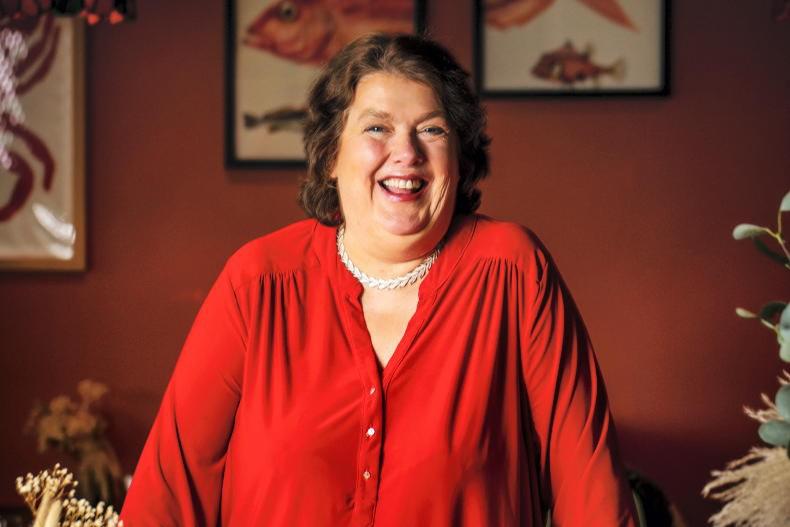

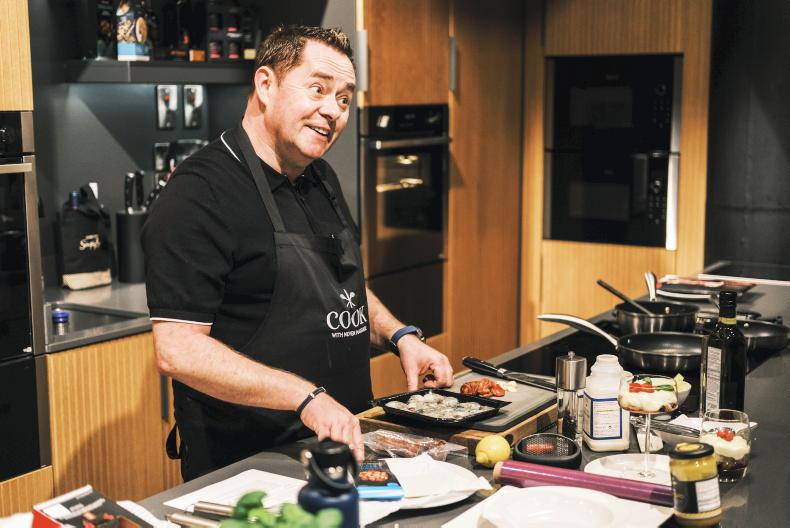
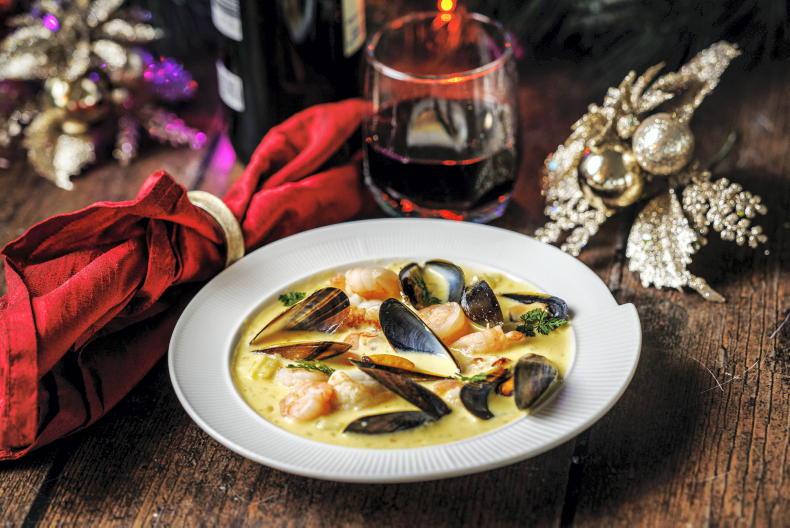
SHARING OPTIONS